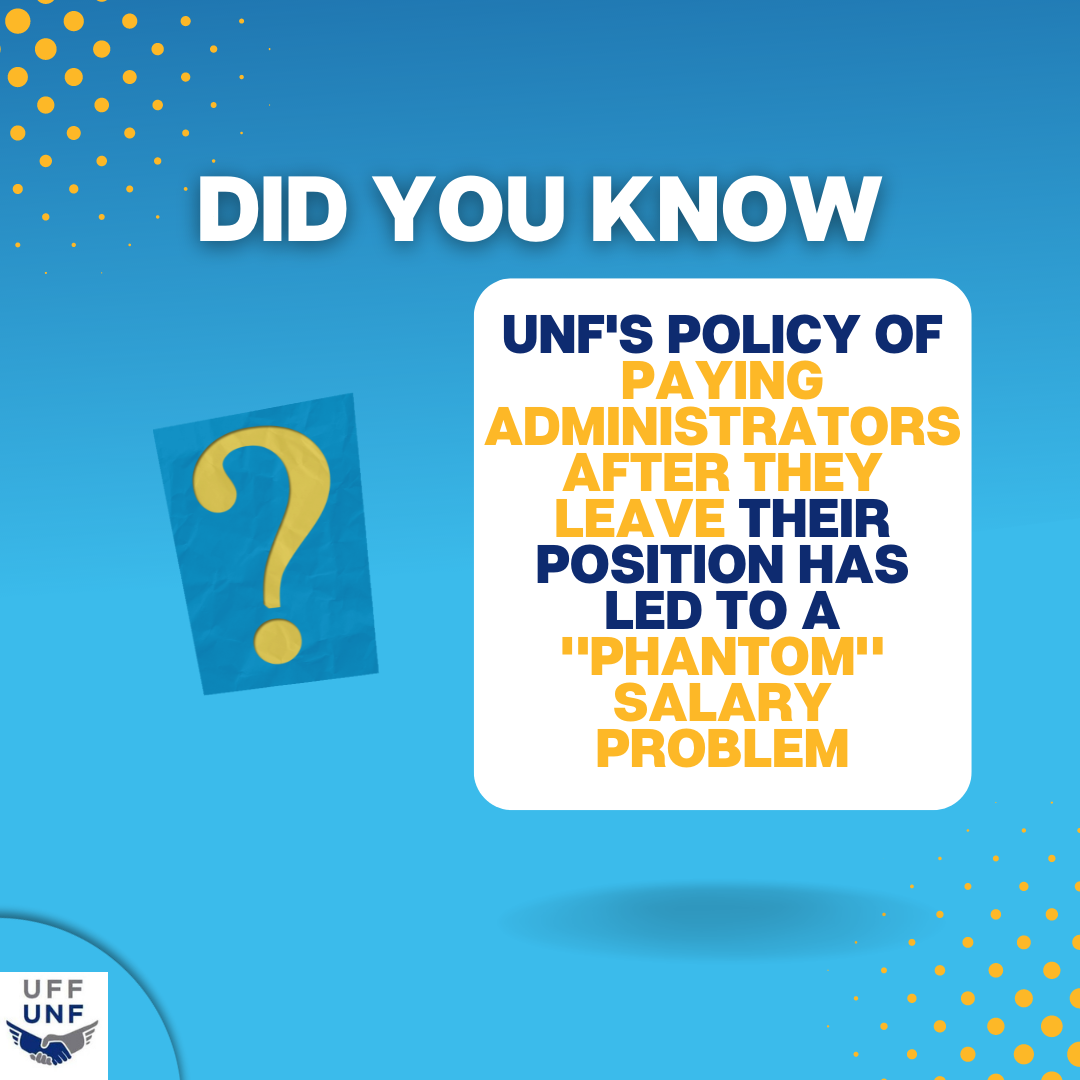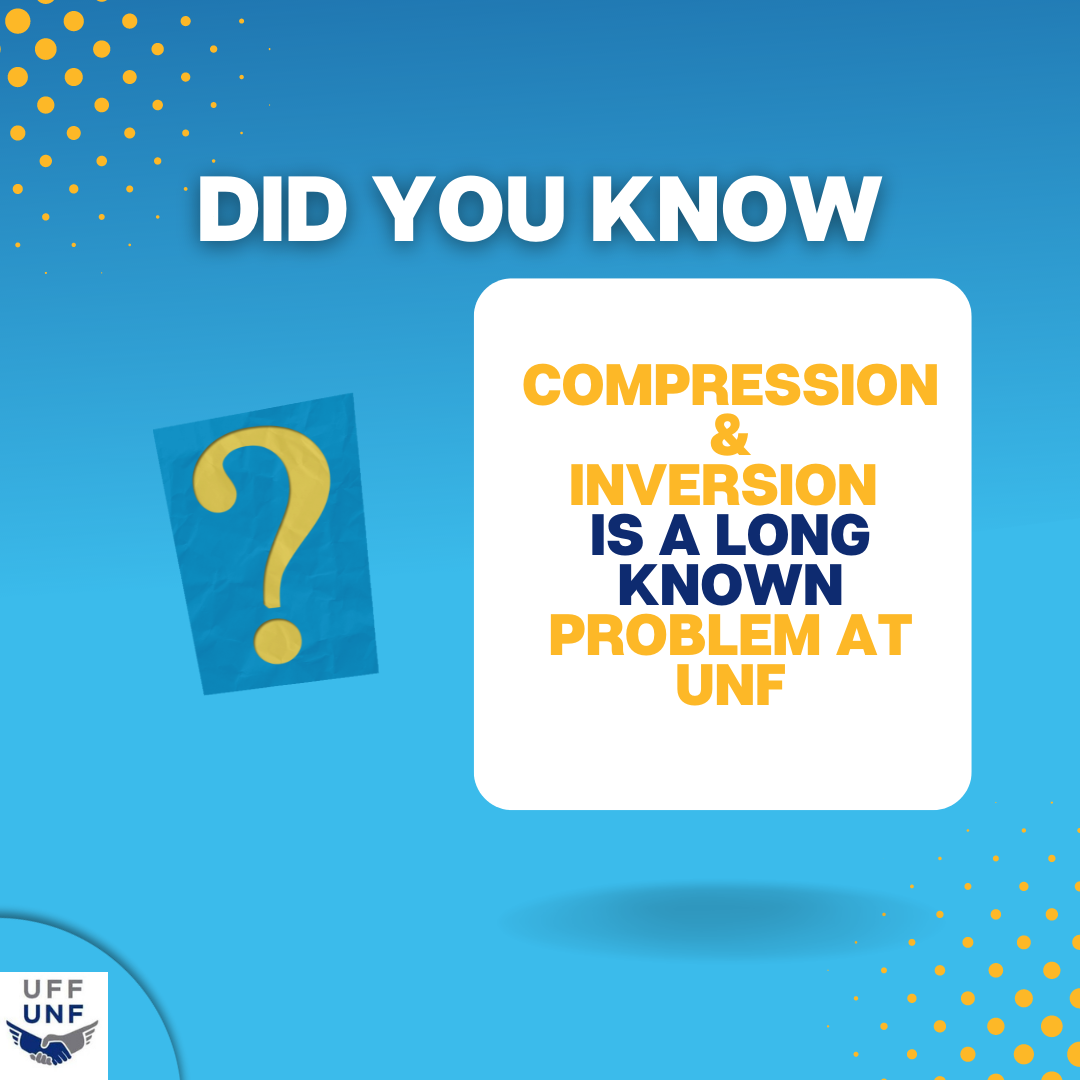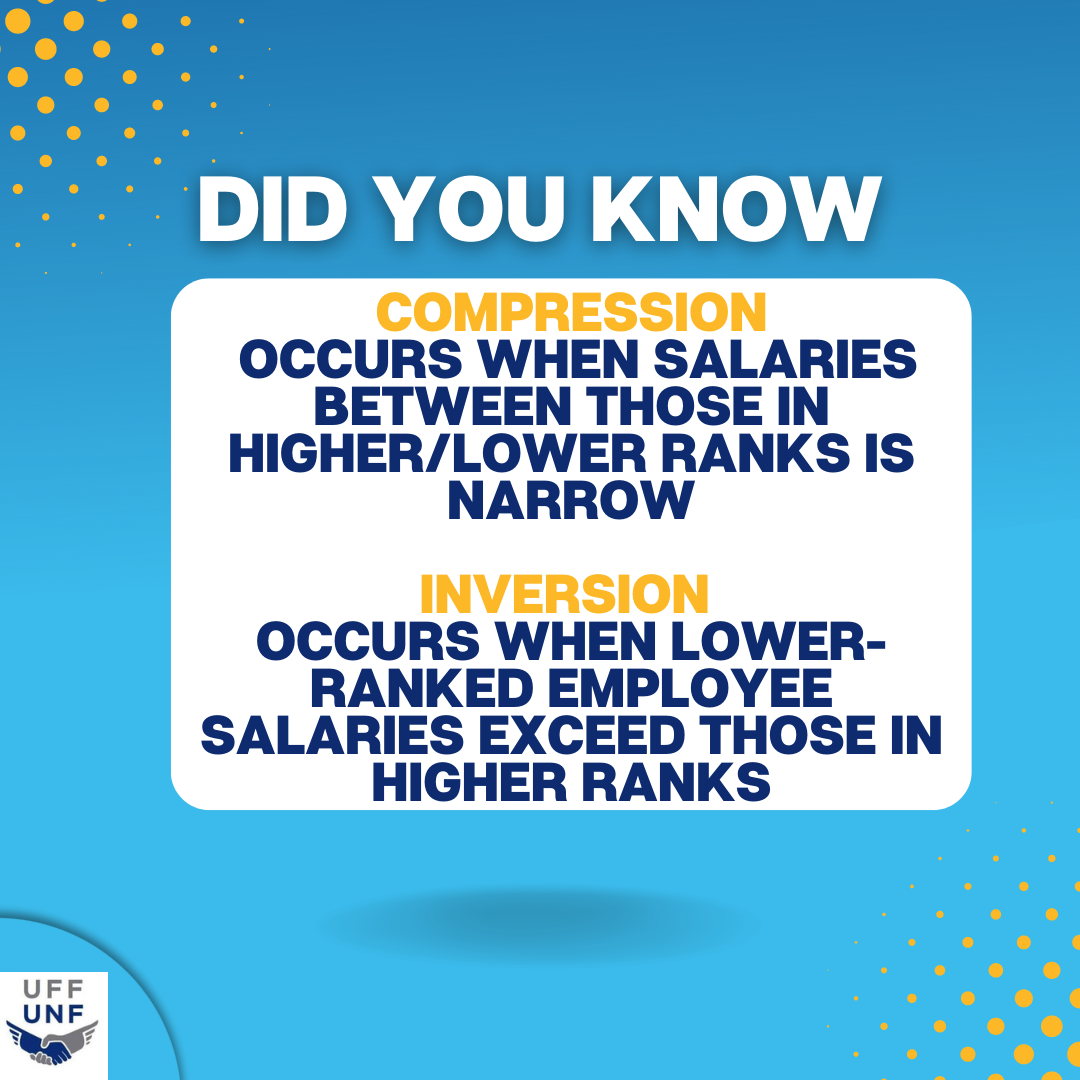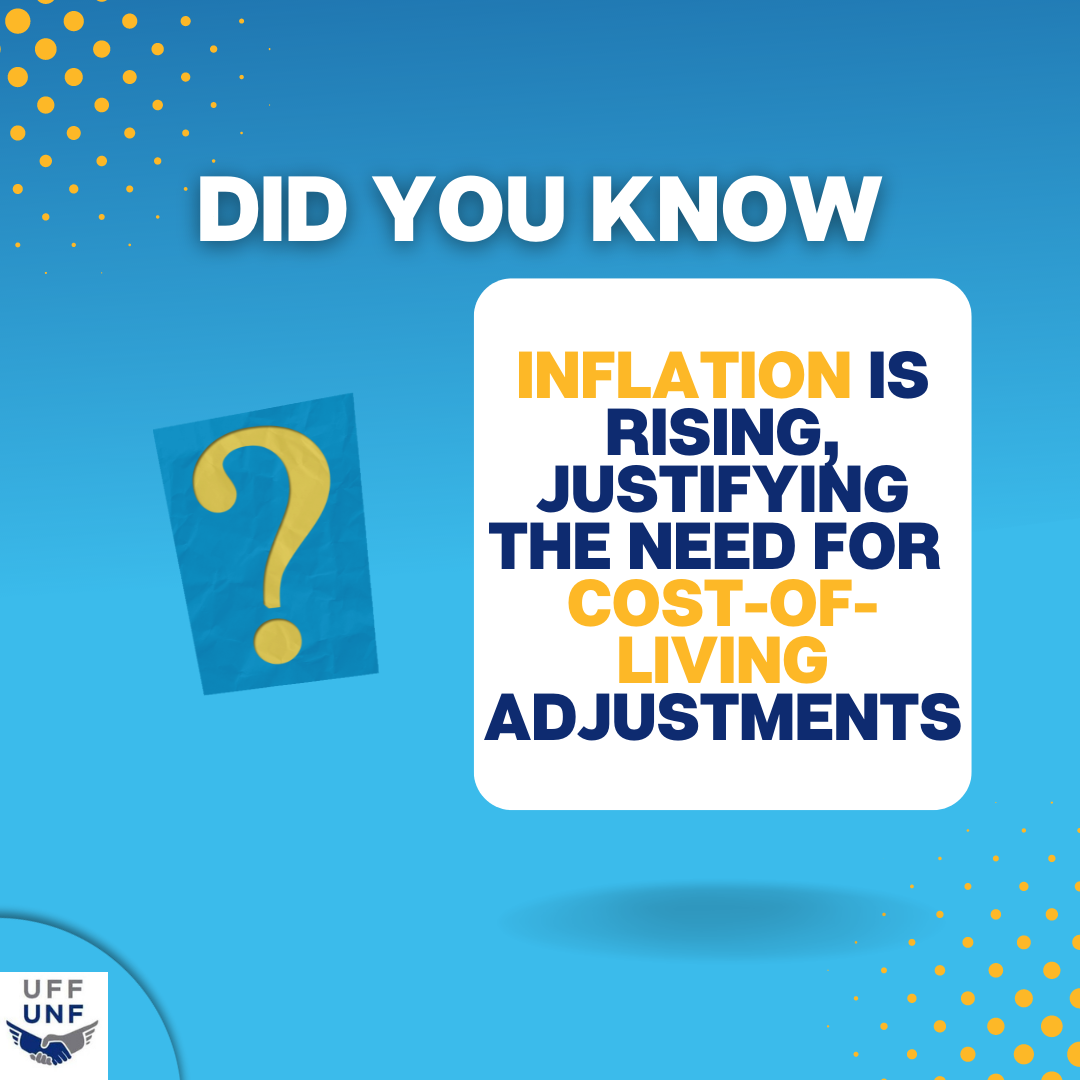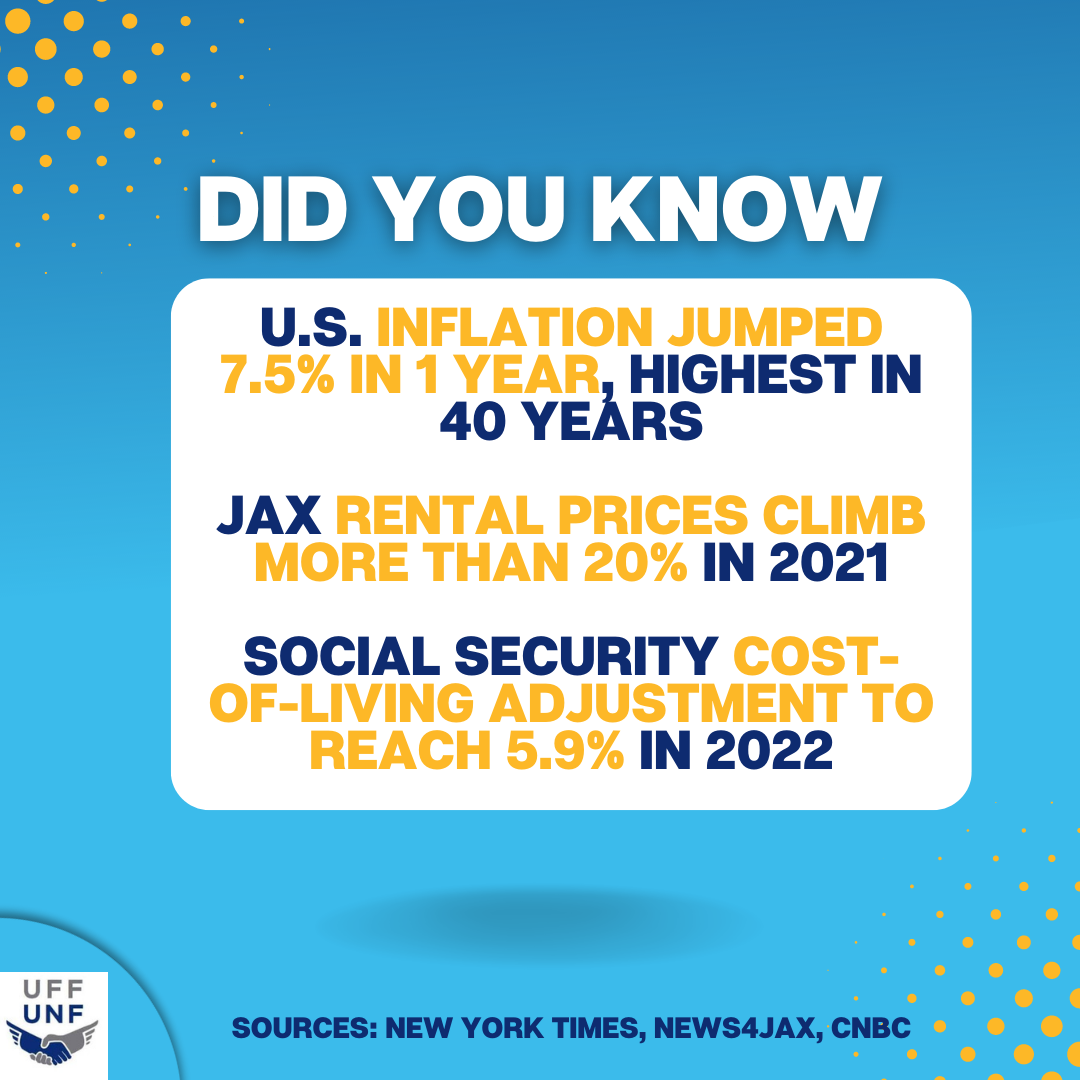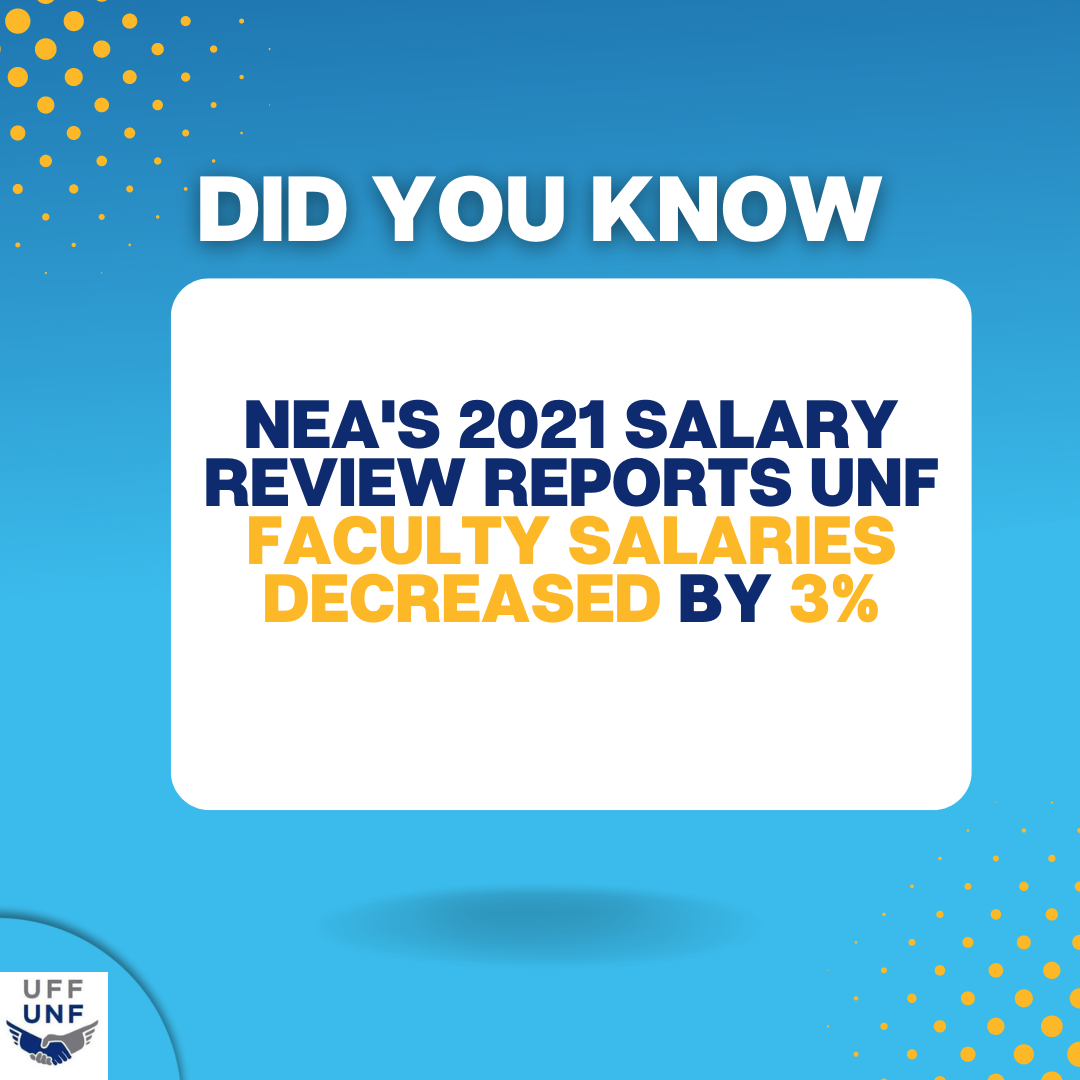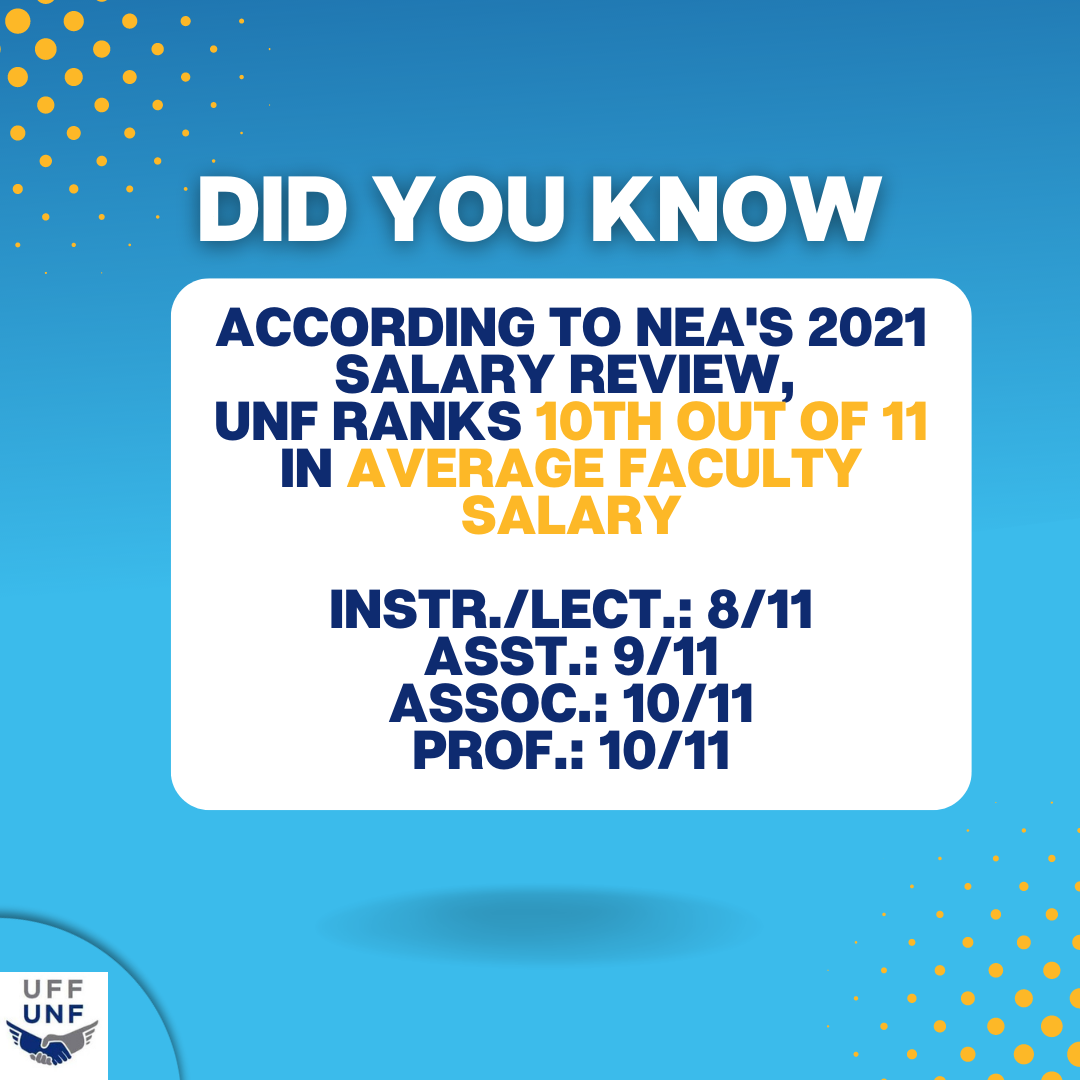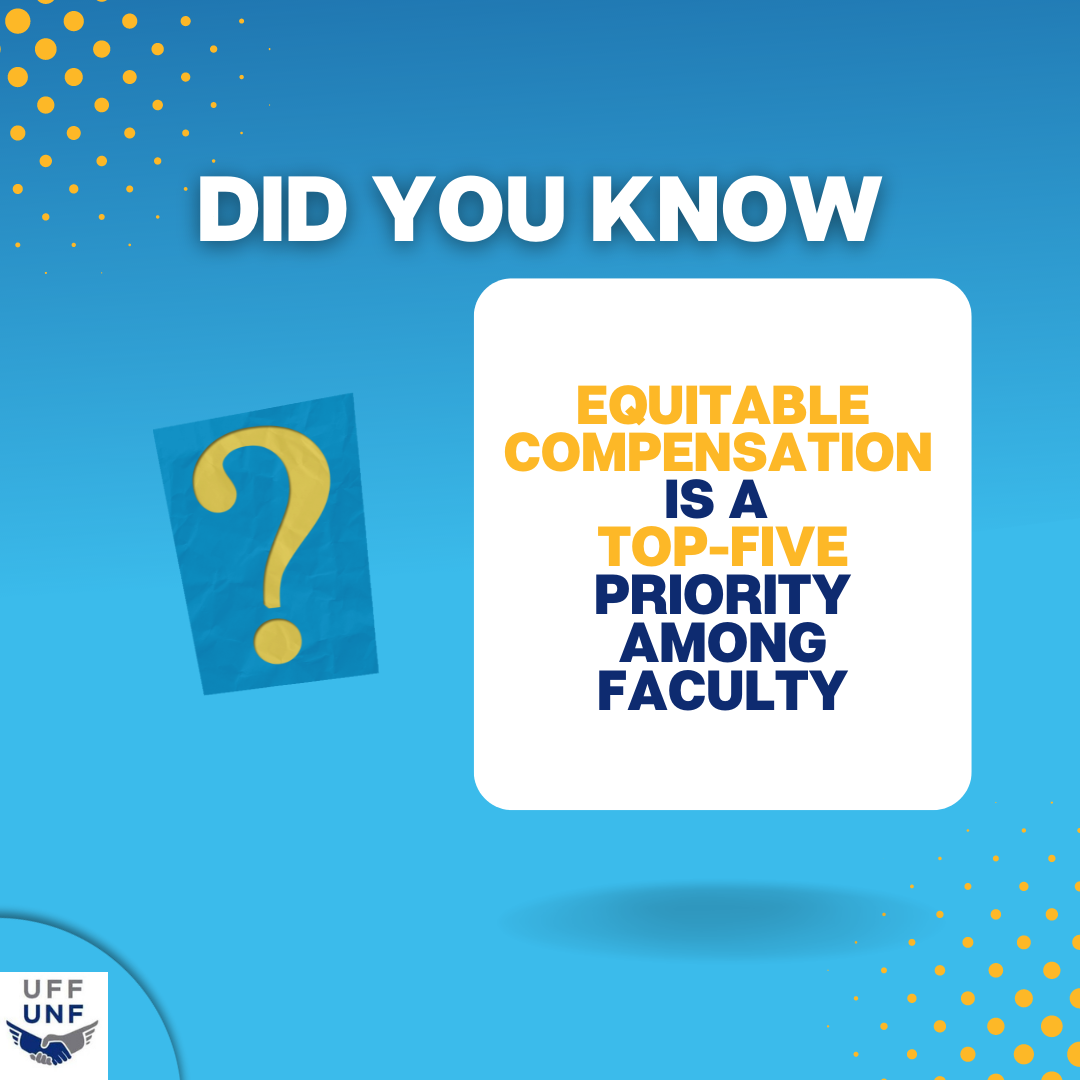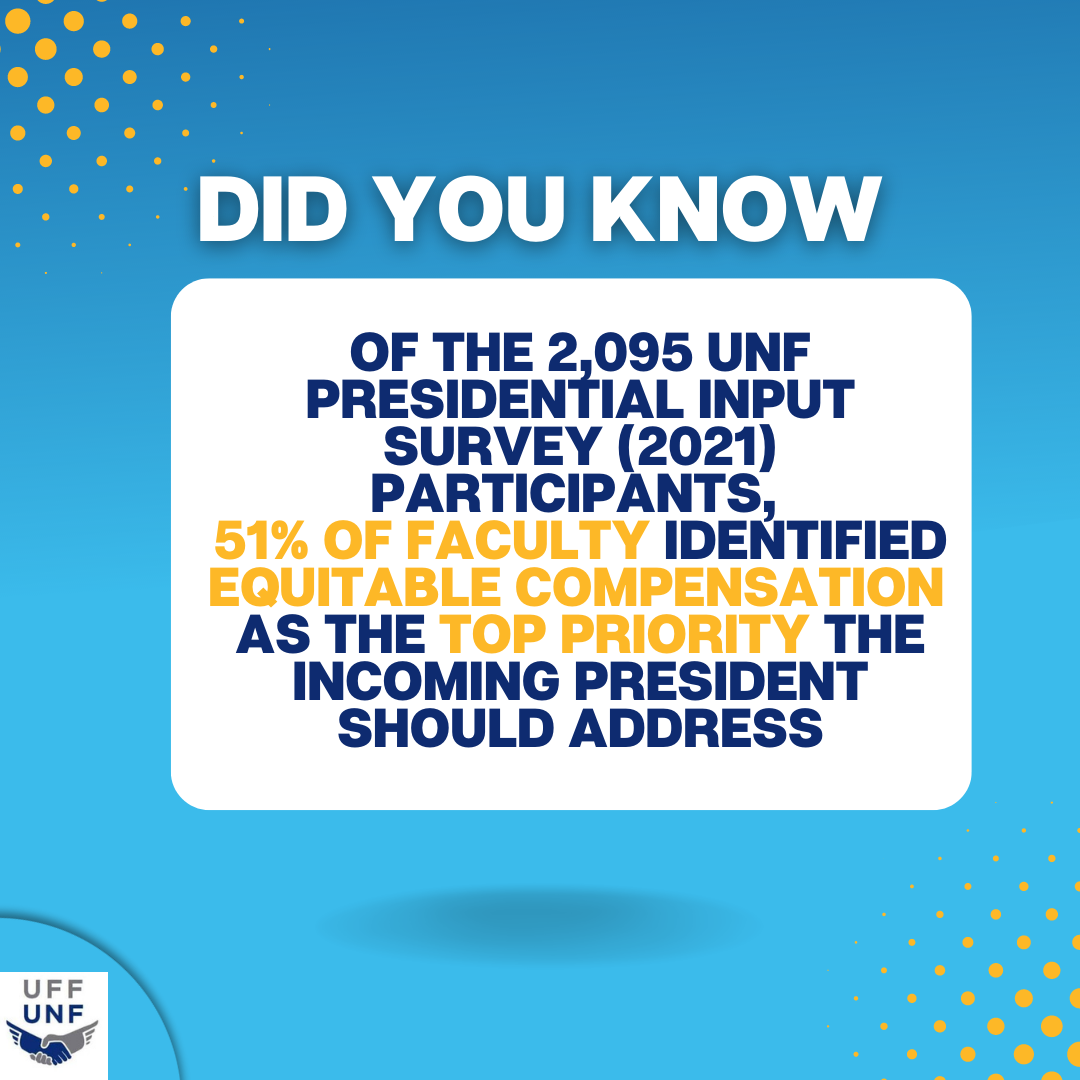You have a right to know about your workplace. Did You Know? is an ongoing informational campaign designed to provide the UNF community with brief factual tidbits about matters important to faculty. Every #didyouknow feature arose out of questions and issues that UNF-UFF confronts on a regular basis.
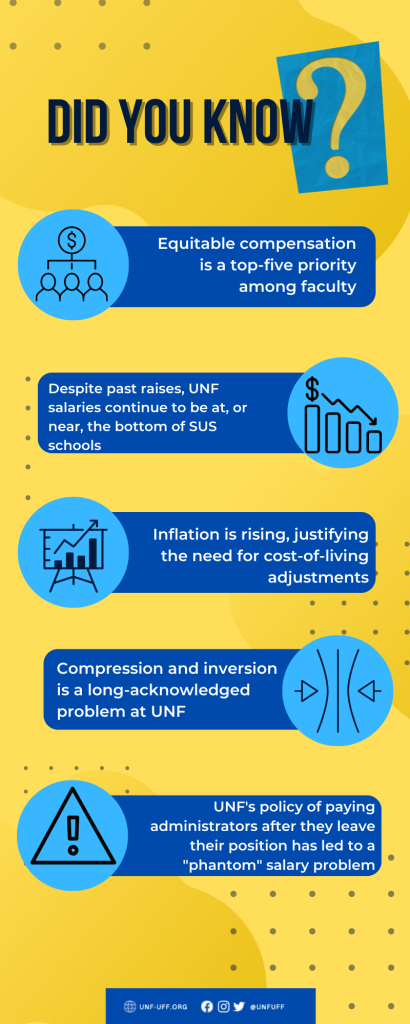
Did you know that while a great majority of faculty (69.4%) find satisfaction and enjoyment in their job, an overwhelming majority (78.4%) are dissatisfied with their wages and (82.8%) don’t feel their work is valued by upper administration (i.e., President and Board of Trustees)?
The “Faculty Life and Job Satisfaction” survey, sponsored by the Faculty Association’s Faculty Enhancement Committee and UFF-UNF, captured feedback on working conditions, job satisfaction, mentoring, and faculty evaluation measures. UNF has conducted similar surveys in past years not only to measure faculty perceptions of workplace issues at a given point in time, but also to provide information to guide faculty governance, administration, and policy reviews.
The following passages demonstrate the fierce commitment of UNF faculty to our students, the university, and each other. Faculty are satisfied in teaching, research, and service. However, that stands in sharp contrast to faculty perceptions of low wages, and perceptions of being valued by the upper administration.
Job Enjoyment
Faculty were asked their level of satisfaction with job enjoyment. The majority (69.4%) indicated they were somewhat (43.0%) or extremely satisfied (26.4%) with their enjoyment of their job.
Comments Related to Job Enjoyment
Faculty made 8 separate positive comments about their working conditions. When discussing generally positive statements, faculty mentioned other faculty members, students, and their department chairs. They expressed appreciation for the talented and dedicated faculty and the work that their colleagues did.
Salary and Benefits
Additionally, the survey asked faculty about their level of satisfaction with their annual salary. The majority (78.4%) of faculty indicated they are either extremely dissatisfied (49.4%) or somewhat dissatisfied (29.0%) with their annual salary. Notably, this level of dissatisfaction was not significantly different across part-time or full-time status, rank, or college, despite the salary differentials by rank. Thus, at all levels, faculty are dissatisfied with their annual salary.
Comments Related to Salary
The largest comment category concerned low salary, with 36 faculty members across colleges and rank expressing concerns. Respondents noted concerns about compression and inversion and a lack of salary increases to keep up with inflation. Faculty linked low salary to feelings of low morale and lack of respect from administration. They also cited low salaries causing difficulties with retention and recruitment of faculty members.
Related to salary and the university budget, three faculty members expressed concerns over the number of administrative positions compared to faculty positions at the university.
Value from Upper Administration
Few faculty (17.2%) agreed with the statement that their work is valued by upper administration (i.e., President and Board of Trustees), with 17.7% disagreeing and 39.4% strongly disagreeing with the statement. There were no significant differences by rank or by college. (A note for clarity: the chart reflects feedback from full-time faculty only, while the paragraph data reflects full-time and adjunct faculty combined.)
Comments Related to Leadership
Three faculty members indicated positive feelings toward leadership at the department, college, and/or university level. An additional faculty member specifically mentioned the Provost as supportive of faculty. Six faculty members indicated there was poor leadership at the college level (across several colleges, with three being from the College of Arts and Sciences), while seven commented on poor leadership in general at the university level.
Nineteen faculty members specifically mentioned that they feel unsupported by the university president. These faculty indicated they feel disrespected and unvalued by the administration, and that they are not heard. Faculty stated they feel this has contributed to loss in fundraising, recruitment of students and faculty, and advocacy for the university. Several faculty indicated they felt an adversarial tone from the president and expressed concern over his communication and relations with faculty organizations. These faculty also feel the president is not connected to faculty and does not understand the faculty perspective.
Each year, the NEA Higher Education Advocate produces “The Special Salary Study” which compares salaries at universities and colleges nationwide to identify salary trends across institutions.
The 2016-2017 Faculty Salary Report examines full-time faculty salaries for 9-10 month contracts in 1570 public institutions, with state data grouped by level of degree offered.
Source: NEA Higher Education Advocate, 36(2), PAGE 18
Compared to the other doctoral granting institutions in Florida’s State University system,
- UNF ranks 8th of 10 in average salary for Professors,
- UNF ranks 9th of 10 in average salary for Associate Professors,
- UNF ranks 9th of 10 in average salary for Assistant Professors,
- UNF ranks 10th of 10 in average salary for Instructors, and
- UNF ranks 9th of 10 in overall average salary for full-time faculty.
UNF was the only doctoral granting institution in Florida’s State University system to experience a negative change (-0.1%) in salary from the 2015-16 academic year to the 2016-17 academic year.
Dues May Be Tax Deductible!
As an UFF-UNF member, your dues are typically deducted from your paycheck and are considered after-tax deductions, meaning tax is withheld from your paycheck before your dues are paid.
Please consult with the IRS and your tax specialist to find out about the union dues tax deduction.
Note: Union dues may only be deductible if you itemize on Schedule A, but not if you take the standard deduction. To find out if you qualify for a deduction, you need to calculate your AGI (Adjusted Gross Income), as well as all unreimbursed employee expenses (see link). Your union dues may be considered part of these “unreimbursed employee expenses.”
Refer to the IRS Publication 529 for more information on unreimbursed employee expenses.
Membership SAVES You Money!
UFF members are automatically members of NEA, AFT, and FEA, and get access their benefits programs.
- $1 million employment liability coverage
- Two free 30-minute consultations with a participating attorney each year.
- Free financial planning services and consumer information
- Free classroom resources
- Special rates on auto and home loans, mortgages, auto and home insurance policies, and disability insurance
- Discounts on hotels, auto buying, car rentals, moving costs, cellular phone plans, computers, books and media, dining, theme park tickets, movie tickets, and pet insurance.
- Scholarship programs for members’ children.
- The Union Plus credit card. After 3 months as a cardholder, you maybe be eligible for hardship grants. All grants approved for eligible cardholders are made by check and you never have to pay them back.
Be sure to explore member benefits available from NEA (National Education Association) and AFT (American Federation of Teachers). You belong to both national organizations through UFF. You also belong to the state union, the FEA (Florida Education Association).
AFT Member Benefits: www.aft.org/about/member-benefits
NEA Member Benefits: www.neamb.com
FEA Member Benefits: www.feaweb.org/member-benefits







